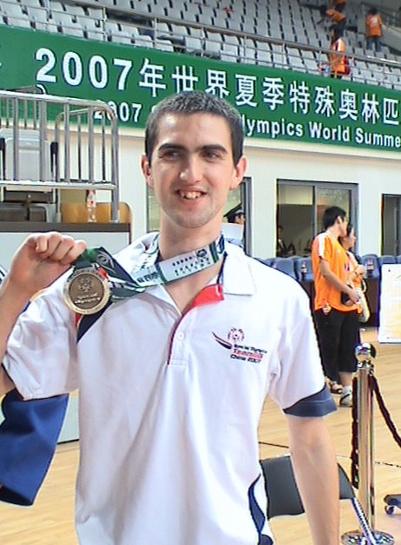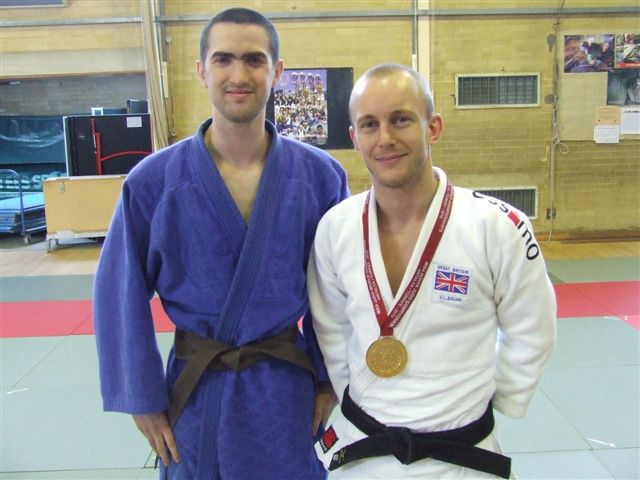Liam Duhigstarted doing Judo at the age of 16 at Westerleigh Judokwai in Battle East Sussex, he now attends Witley Judo Club where he both coaches the Juniors and trains with the Seniors, and coaches at Hollywater Judo Club (Hersham). Westerleigh Judokwai was for a very long time was the only Judo Club in the South East and Southern Sport Regions to offer Intellectually Disabled athletes the sport of Judo, however this has now changed and Hollywater Judo Club (Hersham) offer it to under 16’s and Witley Judo Club will offer Intellectually Disabled Judo across all ages but athletes need to register via Hollywater Judo Club (Hersham). Hollywater Judo Club is a relatively new club for members of the public to join prior to January 2014 it was solely for Hollywater School use. In September 2014 Liam completed and passed his Level one Judo coaches assessment, and now along with the other coaches at both Witley Judo and Hollywater Judo Liam teaches others the Sport of Judo. Liam has a particular interest in helping those athletes with disabilities get the best out of Judo as others have helped him
December 2017, Hollywater Judo Club opened in HERSHAM. The two sessions will be led by Hersham’s very own resident coach Liam Duhig. The sessions will be run on a Thursday afternoon with Judo Kids who are age 5 to their 8th Birthday session being 5:15pm till 6:15pm and Judo Juniors who are aged 8 to 16 session being 6:30pm till 7:45pm. The club has the full support of Hersham’s Councillors who represent the village on both Elmbridge Borough Council and Surrey County Council the club also has the full support of The Hersham Village Society.
Hollywater Judo Club will cater for children of all abilities including disabilities, Judo can be adapted to suit the vast majority of disabilities, and in fact the only people who should not take part in the sport, are those with either unstable Atlanta-Axial bone in the neck or severe spinal injury. Liam regularly coaches children who are confined to wheelchairs for their mobility.
A Brief History of Judo:-
Judo originated in Japan and is a form of unarmed fighting mainly using throws, arm locks, strangles and holds. Judo is translated as "the gentle way"
Jigoro Kano, was born in 1860, and is the founder of Judo as we know it today.
Kano developed Judo from Ju-Jitsu, removing the brutal parts to leave an art, that could be practised with control and relative safety.
In 1886 the Japanese Government arranged a special match between the top 15 Ju-Jitsu fighters and the 15 top Judoka, which resulted in a win for Kano's Judo, and was therefore accepted as the Governments approved sport.
It was later taught in schools and colleges as part of the education system in Japan.
The first Judo competition was very different to how we know and understand it today. Only 1 score was valid, and the contest was fought until one of the players scored, this was a 'one point' score IPPON. Some time later a 'half point' score was added WAZARI. When Judo reached the West, the remainder of the scores were added along with the contest time limits.
The British Judo Association (BJA) was formed in 1948, and is the National Governing Body for Judo in the UK and Channel Islands.
Judo was first included in the Olympic Games as a recognised sport for men at the 1964 Tokyo Games, with Judo being recognised as an Olympic sport for women at the 1992 Olympics in Barcelona Spain. Judo became a Paralympic sport for men at the 1988 games held in Seoul South Korea, with women following 4 years later in 1992. 11 years later Judo became an approved sport for Special Olympics at the 2003 Special Olympics World Summer Games in Dublin Ireland.
Liam's Major Competition Results:-
2003 - Sweden invitational SN Judo SILVER
2004 - SE Regional Judo Games SILVER - Hastings
2005 - SO National SN Judo Games GOLD - Glasgow
2007 - Special Olympics World Games BRONZE - Shanghai
2008 - BJA SN Judo Championship BRONZE - Sunderland
2008 - SE Regional Judo Games SILVER - Hastings
2008 - Euro SN Judo Championship GOLD - Bradley Stoke
2009 - Welsh invitational games BRONZE - Cardiff
2009 - SO National Judo Games GOLD - Leicester
2009 - BJA SN Judo Championship SILVER - Largs Scotland
2009 - International SN Judo BRONZE - Cardiff
2010 - Scottish Invitational SN Judo SILVER - Livingstone Scotland
2010 - BJA SN Judo Championship SILVER - Cardiff
2011 - 10th Anniversary Euro SN Judo Championships GOLD - Bradley Stoke
2011 - SE Regional Judo Games SILVER - Battle
April 2012 - ESSN Judo Championship SILVER - Livingston Scotland
May 2012 - Queens Diamond Jubilee Championships BRONZE - Battle
Oct 2012 - International SN Judo Tournament 6th PLACE - Baarlo Holland
April 2013 - Scottish National Pan-Disability Judo GOLD - Edinburgh
July 2013 - SO National Judo Games SILVER - Battle
Oct 2013 - Hampshire CC Intellectually Disabled Judo Competition SILVER - Yateley
April 2014 - ESSN Judo Competition GOLD - Livingstone Scotland
Nov 9 2014 - Hollywater Judo SN Competition Result TBA - Yateley POSTPONED NEW DATE TO BE ANNOUNCED
Nov 23 2014 - BJA SN Judo Championship Result TBA - Cardiff WITHDREW ILL HEALTH
April 25 2015 ESSN Judo Competition Livingstone Scotland SILVER.
August 29 2015. BJA/SOGB National Pan-Disability Judo GOLD
September 26 2015 Special Olympics Scotland invitational games Edinburgh (2 competitions Newaza & standing start GOLD in both competitions

Liam Duhigproudly showing the Bronze medal he won for Team GB at the 2007 Special Olympics World Summer Games held in Shanghai China
Liam in action at the 10th Anniversary European SN Judo Championships held at Bradley Stoke near Bristol on 6th February 2011

Liam Duhig alongside Ben Quilter
A short clip of Liam in action at the 2009 National Games held in Leicester
There are SPECIAL RULES AND REGULATIONS that are laid down by the International Judo Federation (IJF) that relate to Special Needs (Intellectual Disability) and Disabled Judo including medical requirements. In England and the Channel Islands this is managed by the British Judo Association (BJA). As with main stream Judo Athletes it is a LEGAL requirement to have a Licence to both train and take part in competitions. For information I have copied the minimum requirements and put them below, however for a full copy of the current regulations please contact the BJA on 01509 631670 or visit www.britishjudo.org.uk
1) There must be a minimum of TWO coaches on the Tatami
2) All coaches and volunteers must hold a current FULL Enhanced Disclosure and Barring Service (DBS) certificate
3) All coaches must hold a current NSPCC Safeguarding certificate
4) The club must have a Child and Vulnerable Adult Protection Officer (who is NOT one of the coaches
5) Athletes with Downs Syndrome who have been diagnosed as having ATLANTO-AXIAL instability may not participate in the sport of Judo. (A medical certificate must be obtained confirming that they do NOT have Atlanto-Axial instability prior to being allowed to take part in Judo)
6) The following techniques are not permitted:-
a) Techniques which appear to be sacrificial throws (sutemi-waza)
b) Arm-lock techniques (ude-kansetsu-waza)
c) Entwine/Embrace techniques - strangulations (shime-waza)
d) Triangle techniques (sankaku-waza)
e) To carry out a forward throw on one or both knees
f) To pull away the legs of the opponent with TWO hands (morote-gari and ryo-ashi-dori)
g) Grab one leg of the opponent and reap the supporting leg (o-uchi-gari)
h) Falling on top of another contestant after carrying out a good technique
The rules that govern if someone is Intellectually Disabled (known as Special Needs in the UK), is set by The World Health Organisation (WHO).
Which states the Following:-
A person with an Intellectual Disability is defined as having an IQ of 69 or less, has significant limitations in adaptive behaviour and the age of onset of the disability is being within the development years - Birth to Two years of age.
The W.H.O. describes Intellectual Disability as a "hidden disability" which is lifelong, and should not be confused with the UK Education Authority term of Special Educational Needs which might only be for a short term. Intellectual Disability inhibits how a person learns and performs every day functions that others take for granted. It also reduces communication, understanding, social and living skills